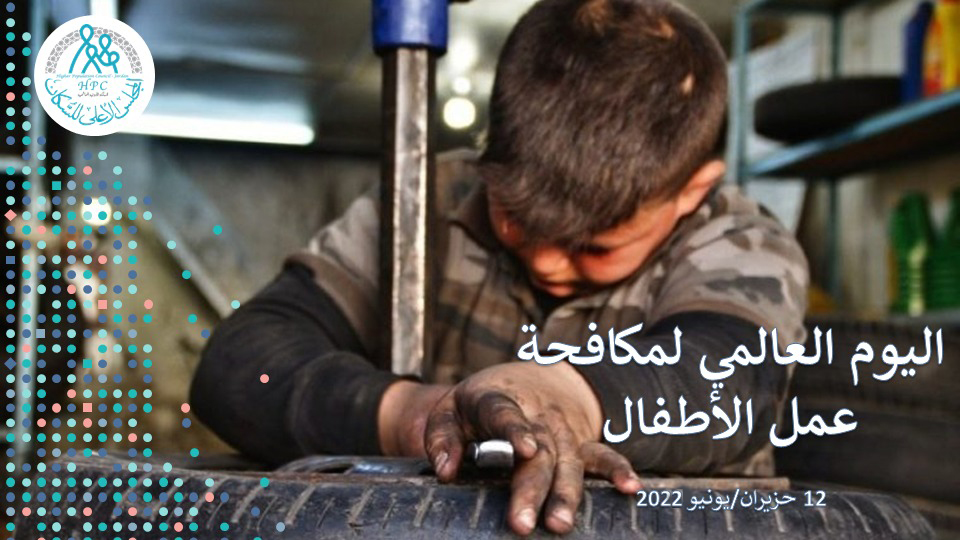

Jordan joins the world in celebrating World Day Against Child Labour today, June 12. The theme for this year is “Universal Social Protection to End Child Labour”, which calls for increased investment in social protection systems and schemes to establish solid social protection floors and protect children from child labour.
Social protection is a human right and an effective policy tool to prevent families from resorting to child labour in times of crisis. However, even before the COVID-19 crisis took hold, government social protection has been essential to fight poverty, vulnerability and eradicate and prevent child labour.
in a press release issued to mark this occasion, the Higher population Council stressed that when children engage in dangerous activities their physical, mental, social or cognitive growth is jeopardized, rendering them unable to play an active role in capitalizing on the demographic window of opportunity that will reach its peak in 2040.
HPC explained that one out of four children (aged 5-17) in the least developed countries engage in activities considered to be harmful to their health and growth. While significant progress has been made in reducing child labour over the last two decades, progress has slowed over time, and it has even stalled during the period 2016-2020, according to 2022 estimates on the United Nations website. As an international response, the UN General Assembly requested the International Labour Organization in 2021 to take the lead in the implementing member states commitments and taking effective and immediate measures to eradicate forced labour, modern slavery, human trafficking, and the worst forms of child labour, including recruitment and use of child soldiers. The General Assembly also recognized the importance of revitalized global partnerships to ensure the implementation of the 2030 Agenda for Sustainable Development, including the implementation of the goals and targets related to the elimination of child labour. Target 8.7 under SDG 8 (decent work and economic growth) indicates that effective and immediate measures should be taken to end child labour in all its forms by 2025. This is measured by the percentage and number of children aged (5-17 years) who are engaged in child labour disaggregated by gender and age.
International data on child labour indicate that Africa ranks first in the number of children engaged in labour, with 72 million children, while the Asia-Pacific region ranks second, with 62 million children.
HPC noted that Jordan was one of the first countries to ratify international conventions related to the protection of children from economic exploitation, namely the Convention on the Rights of the Child and its two protocols, as well as ILO conventions (ILO Convention No. 138 on Minimum Age and Convention 182 on the Worst Forms of Child Labor). Moreover, national legislation related to combating child labor are fully consistent with international conventions.
The Child Labor Survey carried out in 2016 by the Center for Strategic Studies at the University of Jordan and the Department of Statistics indicated that there are 40,30384 children aged (5-17 years) in Jordan, of whom 75,982 (1.89&) are engaged in labour. Estimates indicate that this number has increased over the past years for various reasons, including the economic conditions, the Covid-19 pandemic and their impact on families. According to the Survey, 44917 children are engaged in hazardous labour (i.e., 54% of working children) with 3.24% males, 0.05% females. Syrian children ranked first among working children in Jordan, while children of other nationalities came in second place, and Jordanian children came in last. With regard to child labor by age, 53% are in the older age group (15-17 years), followed by the middle age group (12-14 years) at 30%, and then the youngest age group (5-11 years) at 17%.
With respect to the main economic activities that working children engage in, the survey showed that the majority of working children in Jordan work in wholesale, retail and motor-vehicle and motorcycle repair (29%), followed by agriculture and forestry (28%), manufacturing and constructions (11%). On the other hand, 32.9% of working children work over 48 hours per week with an average monthly income of JD 171.
HPC noted that Jordan has taken significant steps in an effort to curb child labour and enhance the responsiveness of child labour policies, established the Child Labour Unit at the Ministry of Labour, which chairs the National Committee on Child Labour. Moreover, the 2020 National Framework for Combating Child Labour and Begging was designed and launched to integrate and enhance efforts to combat child labour.
HPC elaborated that intensified national and international efforts to combat child labour have become necessary, and institutional interventions in relevant policies and strategies, including the National Population Strategy (2021-2030) and the National Strategy Social Protection (2019-2025) and the National Framework for Combating Child Labor and Begging, should focus on developing well-defined programs and mechanisms to combat child labor, thereby achieving social development goals.







